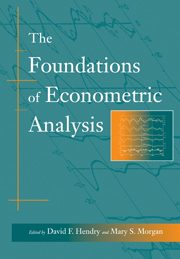Book contents
- Frontmatter
- Contents
- Preface
- Acknowledgements
- Introduction
- Bibliography
- I The Emerging Role of Econometrics in Economics
- 1 The Scope and Method of Political Economy (Macmillan, London, 1891, pp. 313–14, 320–31)
- 2 Business Cycles (California University Memoirs, vol. III, Berkeley, 1913, pp. 19–20, 449–51)
- 3 Economic Cycles – Their Law and Cause (Macmillan, New York, 1914, pp. 66–8, 84–8 (cut))
- 4 An Essay on the Nature and Significance of Economic Science (Macmillan, London, 1932, pp. 98–105)
- 5 The Common Sense of Econometrics (Econometrica, vol. 1, 1933, pp. 5–12)
- II Early Time-Series Analysis
- III Applied Econometrics and the Identification Problem
- IV The Evolution of Statistical Thinking in Econometrics
- V Dynamic Models
- VI The Tinbergen Debate
- VII Structure and Simultaneity
- VIII The Probabilistic Revolution
- IX Exogeneity
- Index
4 - An Essay on the Nature and Significance of Economic Science (Macmillan, London, 1932, pp. 98–105)
Published online by Cambridge University Press: 05 June 2012
- Frontmatter
- Contents
- Preface
- Acknowledgements
- Introduction
- Bibliography
- I The Emerging Role of Econometrics in Economics
- 1 The Scope and Method of Political Economy (Macmillan, London, 1891, pp. 313–14, 320–31)
- 2 Business Cycles (California University Memoirs, vol. III, Berkeley, 1913, pp. 19–20, 449–51)
- 3 Economic Cycles – Their Law and Cause (Macmillan, New York, 1914, pp. 66–8, 84–8 (cut))
- 4 An Essay on the Nature and Significance of Economic Science (Macmillan, London, 1932, pp. 98–105)
- 5 The Common Sense of Econometrics (Econometrica, vol. 1, 1933, pp. 5–12)
- II Early Time-Series Analysis
- III Applied Econometrics and the Identification Problem
- IV The Evolution of Statistical Thinking in Econometrics
- V Dynamic Models
- VI The Tinbergen Debate
- VII Structure and Simultaneity
- VIII The Probabilistic Revolution
- IX Exogeneity
- Index
Summary
Economic Generalizations and Reality
Statistical ‘Laws’ of Supply and Demand
2 As we have seen already, the generalizations which are deduced from this 98 observation are purely formal in character. If a certain good is scarce, then we know that its disposal must conform to certain laws. If its demand schedule is of a certain order, then we know that with alterations of supply its price must move in a certain way. But, as we have discovered already, there is nothing in this conception of scarcity which warrants us in attaching it to any particular commodity. Our a priori deductions do not provide any justification for saying that caviare is an economic good and carrion a disutility. Still less do they inform us concerning the intensity of the demand for caviare or the demand to be rid of carrion. From the point of view of pure Economics these things are conditioned on the one side by individual valuations, and on the other by the technical facts of the given situation. And both individual valuations and technical facts are outside the sphere of economic uniformity. To use Strigl's expressive phrase, from the point of view of economic analysis, these things constitute the irrational element in our universe of discourse.
But is it not desirable to transcend such limitations? Ought we not to wish to be in a position to give numerical values to the scales of valuation, to establish quantitative 99 laws of demand and supply? This raises, in a slightly different form, the questions we left unanswered at the conclusion of the last chapter.
- Type
- Chapter
- Information
- The Foundations of Econometric Analysis , pp. 98 - 102Publisher: Cambridge University PressPrint publication year: 1995
- 2
- Cited by



